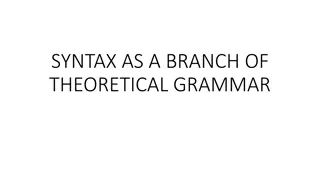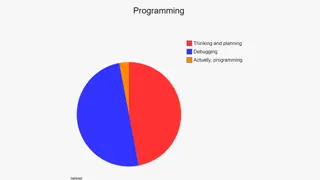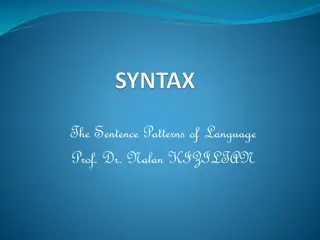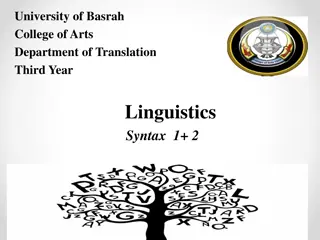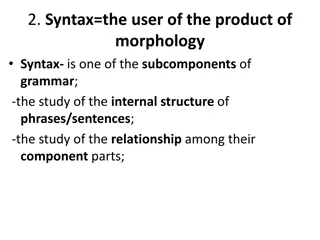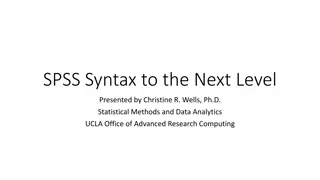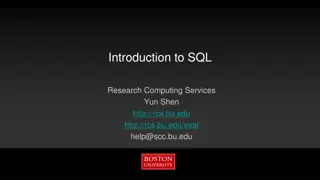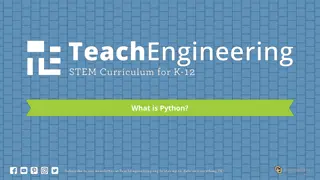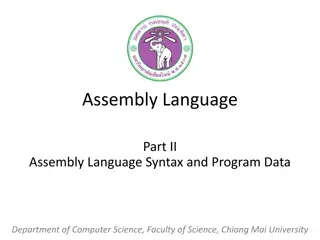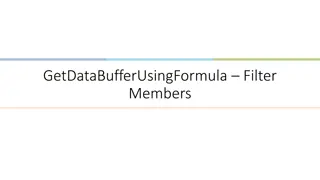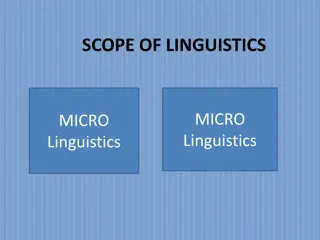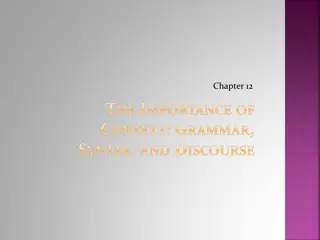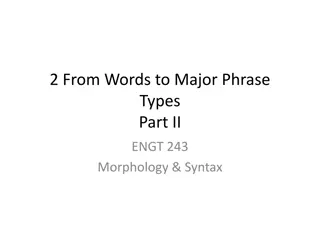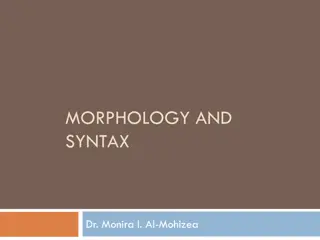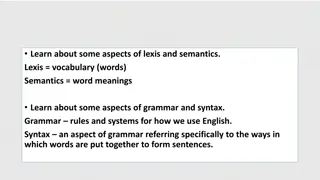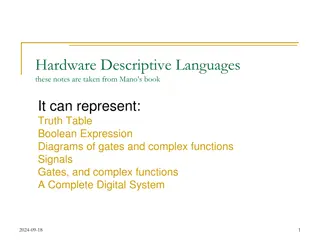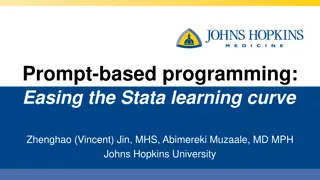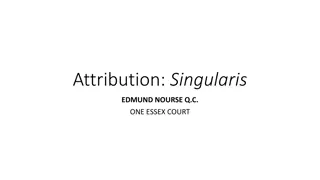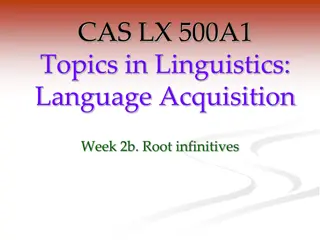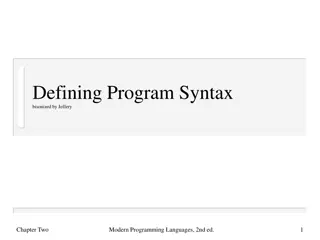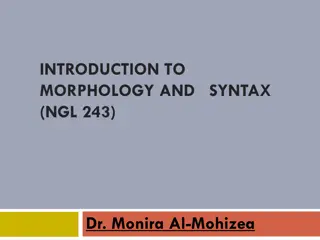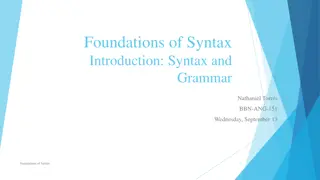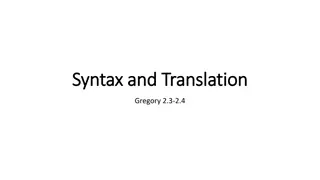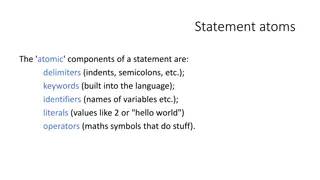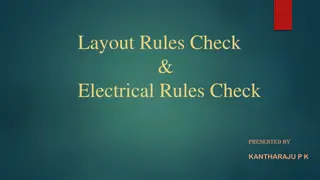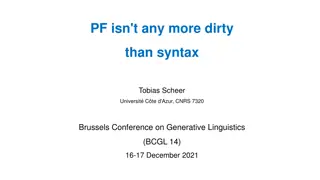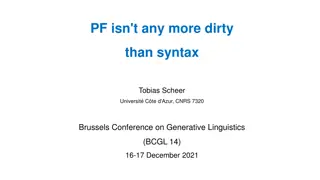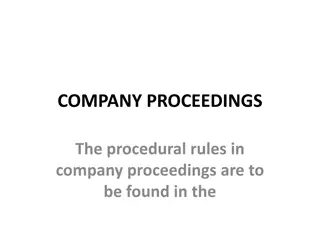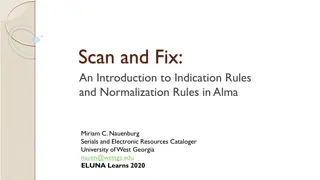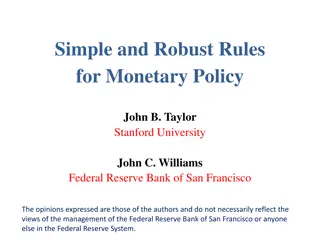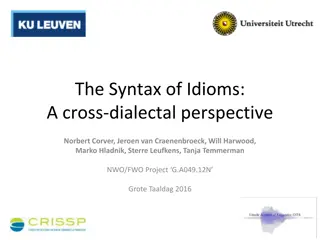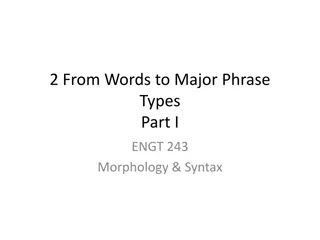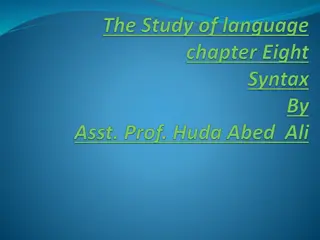Understanding Syntax in Theoretical Grammar
Syntax, as a branch of theoretical grammar, explores the combination of words in phrases and sentences, focusing on their relationships and functions in communication. Basic syntactic notions, such as syntactic units, syntactic meaning, and syntactic relations, play a crucial role in shaping the str
5 views • 17 slides
Understanding Language Syntax Through Syntax Trees
Explore how both programming languages and spoken languages can be parsed into syntax trees, revealing the syntactic structure of sentences. Learn about terminals and non-terminals in syntax trees and how they represent different components of language. Dive into syntax tree abstraction for a deeper
3 views • 32 slides
Understanding Sentence Patterns in Language: A Guide by Prof. Dr. Nalan Kiziltan
Language consists of sentences organized by grammar rules. Syntax plays a crucial role in sentence structure. This guide explores sentence patterns, syntax principles, linear order, and hierarchical structure in language, illustrated with examples and constituent tests.
0 views • 111 slides
Understanding Syntax in Linguistics
Syntax, originating from Greek meaning arrangement, deals with the structure of sentences in a language. Generative Grammar, coined by Noam Chomsky, uses rules akin to mathematics to create new, grammatically accurate sentences. By applying recursion and deep structure analysis, linguists explore th
2 views • 20 slides
Understanding Syntax and Grammar Components
Syntax is a vital subcomponent of grammar that involves studying the internal structure and relationship of phrases and sentences. Grammar components include Lexicon/Vocabulary, Phonological Form, Syntactic component/Grammar, and Logical Form. Constituents are parts that combine to form a whole stru
2 views • 40 slides
Mastering SPSS Syntax for Advanced Data Analysis
Delve into the world of SPSS syntax with this workshop by Christine R. Wells, Ph.D., where you will learn to efficiently work with SPSS commands and subcommands, understand when commands execute, and optimize your data analysis process. Discover insider tips on setting options, using SPSS version 28
2 views • 141 slides
Learn SQL Basics: History, Syntax, and Terminology
SQL (Structured Query Language) is a specialized domain-specific language for managing structured data in relational databases. Developed in the 1970s, it follows a rigid syntax and structure, with specific features like triggers and stored procedures. Understanding SQL history, terminology, and syn
1 views • 38 slides
Understanding Python Programming Basics
Python is a popular high-level programming language known for its simple syntax, making it easy to learn and versatile for various applications. This introduction covers the basics of Python, including variables, objects, classes, and essential syntax rules like defining functions. Dive into the fun
2 views • 12 slides
Understanding Exceptions in Computer Science
Errors in programming, such as syntax, semantic, runtime, and logical errors, can disrupt the execution of a program. Syntax errors relate to grammatical violations, semantic errors occur when statements lack meaning, and runtime errors happen during program execution due to illegal operations. By i
1 views • 35 slides
Introduction to Assembly Language Syntax and Program Data
Learn about the syntax of assembly language and how data, variables, and constants are used in programming. Explore the basic instructions and the translation of high-level language into assembly language. Discover the role of an assembler in translating assembly language programs into machine langu
4 views • 36 slides
Understanding GetDataBufferUsingFormula.Filter.Members Syntax
GetDataBufferUsingFormula.Filter.Members provides a powerful way to filter account-type dimensions efficiently using formulas. This technique allows for precise filtering without the need to loop through individual members. Learn how to apply FilterMembers syntax to enhance data processing and achie
1 views • 6 slides
Overview of Micro and Macro Linguistics
Micro linguistics focuses on the scientific study of speech sounds, word formation, syntax, and meaning within a language, while macro linguistics delves into the societal, psychological, and neurological aspects of language use. Micro linguistic areas include phonetics, phonology, morphology, synta
1 views • 7 slides
Financial and Eligibility Rules for EU Cooperation Programmes
Financial and eligibility rules for EU cooperation programmes include details on the first-level control unit, sources of information, hierarchy of rules, overarching eligibility rules, and reporting overview. These rules cover areas such as project activities, expenditure eligibility, procurement r
2 views • 27 slides
Rural Access Compliance Rules Proposal by Glenn Disher - PBM Investigator
Proposal by Glenn Disher, a PBM Compliance Investigator, outlines rules for rural access compliance. The proposal focuses on considering local conditions and enforcing rules for maximum impact. It includes recommendations for zip code rules, compliance mileage rules, and examples of non-compliant ru
0 views • 7 slides
Understanding Grammar, Syntax, and Discourse in Biblical Texts
Explore the significance of context in analyzing grammar, syntax, and discourse in biblical Greek and Hebrew texts. Learn about the foundational elements, word order, Greek syntax basics, and the importance of discourse analysis. Delve into the definitions of grammar, syntax, and discourse, and unde
1 views • 30 slides
Understanding Grammar Structures in Morphology and Syntax
Exploring the relationship between words and major phrase types in English morphology and syntax, this content delves into grammar with lexical categories, constituent structures, and the formation of phrases. It highlights the importance of considering constituents and word grouping for accurate sy
0 views • 35 slides
Understanding Morphology and Syntax in English Language
This content explores morphology and syntax in English language, covering topics like conversion, compounding, and the formation of words through various linguistic processes. It delves into examples of verb-noun conversions, productive word formation methods, and compound words. The discussion also
0 views • 27 slides
Understanding Language Structure: Lexis, Semantics, Grammar, and Syntax
Explore the basics of language structure including lexicon and semantics, grammar rules, syntax, elements of noun phrases and clauses, and types of sentences. Dive into vocabulary, word meanings, semantic fields, connotation vs. denotation, and sentence structures. Enhance your understanding of how
0 views • 8 slides
Understanding Hardware Descriptive Languages in Digital Systems
Hardware Descriptive Languages (HDLs) are used to represent various aspects of digital systems, including truth tables, Boolean expressions, gate diagrams, and complex functions. They find application in design entry, logic simulation, functional verification, circuit synthesis, timing verification,
0 views • 19 slides
Enhancing Stata Learning with Prompt-Based Programming
Explore the benefits of prompt-based programming in easing the learning curve of Stata software. This innovative approach simplifies syntax, reduces errors, and enhances efficiency for data analysis tasks. By comparing prompt-based versus traditional syntax methods, researchers can improve their ski
1 views • 54 slides
Understanding Company Attribution Rules in Legal Proceedings
Company attribution rules in legal proceedings are outlined, focusing on primary rules found in a company's constitution, general principles of agency, and exceptions where traditional attribution methods may not apply. The interpretation of laws involving companies and the application of specific a
0 views • 7 slides
Language Development in Children: Morphology and Syntax Acquisition
Children's language acquisition process involves developing morphology by adding inflectional morphemes to nouns and verbs, such as "-ing" and "-s" for plurals. Overgeneralization occurs as children apply rules, leading to expressions like "foots" and "mens". Additionally, irregular plurals and poss
0 views • 13 slides
Syntax in Language Acquisition: Root Infinitives and Small Clause Hypothesis
Children's syntactic development in language acquisition progresses from one-word utterances to combining words into basic sentences. This stage shows missing elements like tense, subject agreement, and auxiliary verbs. The Small Clause Hypothesis suggests that children initially lack certain struct
0 views • 52 slides
Understanding Programming Language Syntax
This content delves into the fundamental aspects of programming language syntax, covering lexical analysis, syntax rules, and semantics. It also explores how grammar works by building parse trees, providing examples from English grammar and programming languages. The use of Backus-Naur Form (BNF) an
0 views • 43 slides
Understanding Morphology and Syntax with Dr. Monira Al-Mohizea
Explore the fascinating realm of morphology and syntax in language with Dr. Monira Al-Mohizea's insightful guide. Learn about the internal structure of words, morphemes, and the aim of morphology to uncover subconscious knowledge. Delve into discussions on what constitutes a word and various definit
0 views • 19 slides
Essential Rules and Syntax for Naming and Using Variables in Bash Scripting
Learn the fundamental rules for naming variables in Bash scripting, understand the syntax for defining user-defined variables, and discover key considerations for assigning values and working with case-sensitive variables. Make the most of your scripting by following these guidelines closely.
0 views • 27 slides
Understanding the Foundations of Syntax in Language
Delve into the basics of syntax and grammar, exploring the essence of language, syntax rules, morphemes, and morphemic decomposition. Discover how syntax shapes meaningful communication and learn to identify morphemes in English words.
1 views • 17 slides
Understanding Syntax and Translation in Logic
Explore the world of syntax and translation in logic through topics such as forming well-formed formulas, identifying main connectives, De Morgan's Laws, Venn diagrams, necessary and sufficient conditions, and more. Discover the language of logic, vocabulary, truth-functional connectives, punctuatio
0 views • 46 slides
Understanding Statement Atoms and Basic Syntax in Programming
The atomic components of a statement include delimiters, keywords, identifiers, literals, and operators. Basic syntax involves single-line statements, inline and block comments, and compound statements categorized by control flow markers. Different languages have distinct ways of structuring code, s
0 views • 12 slides
Layout and Electrical Rules Check by KANTHARAJU P.K.
Layout rules check is essential in preparing masks for fabrication processes to ensure accuracy. Key design rules include minimum width, spacing, enclosure, and extension. Electrical rules checking (ERC) methodology is used to verify design robustness against electronic design rules at schematic and
0 views • 15 slides
Exploring Minimalism in Linguistics: Dirty PF and Clean Syntax
This text delves into the relationship between syntax and PF (Phonological Form) in the context of minimalism theory in linguistics. It discusses how minimalism aims to achieve clean syntax by discarding imperfect elements, with PF often considered as "dirty" due to its association with phonology. T
0 views • 40 slides
Minimalist Approach to Syntax and Phonology in Linguistics
The discussion delves into the relationship between syntax and phonology in linguistics, emphasizing the minimalist approach that aims to create a clean syntax while considering phonology as an ancillary element. It explores the idea that syntax is central to grammar, while phonology is considered '
0 views • 40 slides
Understanding Procedural Rules in Company Proceedings
Procedural rules governing company proceedings can be found in the Companies Proceeding Rules, Companies Winding-Up Rules, and the Federal High Court (Civil Procedure) Rules. These rules dictate the process for applications, such as Originating Summons, Originating Motion, or Petition under CAMA. Th
0 views • 22 slides
Scan and Fix: Indication and Normalization Rules in Alma
Introduction to indication rules and normalization rules in Alma Miriam C. Nauenburg's presentation on the scan and fix workflow. Learn about creating and applying indication and normalization rules, testing rules in the Metadata Editor, and organizing rules as private or shared.
0 views • 54 slides
Simple and Robust Rules for Monetary Policy Overview
This document discusses the historical background, empirical experience, characteristics of simple rules, robustness, and the comparison between optimal control and simple rules in monetary policy. It explores the evolution of policy rules from Smith and Ricardo to modern approaches, emphasizing the
0 views • 22 slides
Exploring the Syntax of Idioms: A Cross-Dialectal Study
Delve into the intricacies of idiomatic expressions through a cross-dialectal perspective, examining both internal and external syntax, and criteria for identifying verbal idioms. Researchers investigate the regular syntactic rules governing idiomatic structures and their interaction with non-idioma
0 views • 46 slides
Understanding Syntax and Lexical Categories in English Grammar
Syntax is the study of rules in generating grammatical sentences, focusing on building grammars that produce well-formed English sentences. It involves organizing words into categories like nouns, verbs, adjectives, and adverbs to form phrases and clauses. Lexical categories are determined based on
0 views • 33 slides
Understanding Syntax in Linguistics
Words in a language are organized into phrases and clauses with specific syntactic categories like Noun Phrase, Verb Phrase, and Adjective Phrase. Each phrase has a head such as a noun, verb, or adjective, and phrase structure rules help diagram the syntactic structure. Clauses are the largest units
0 views • 20 slides
Understanding Grammar and Syntax in Linguistics
Grammar and syntax are two fundamental components of language study. Grammar entails rules for correct language usage, while syntax focuses on sentence structures. Deep and surface structures, along with examples and distinctions between active and passive voice sentences, are explored. Structural a
0 views • 21 slides
Comprehensive Guide to Ontology Editors and IDEs for Ontologies
Explore a wide range of Ontology Editors and Integrated Development Environments (IDEs) for managing ontologies efficiently. From simple text editors to advanced IDEs like Protégé and Web Protege, learn about various tools and syntax options available. Dive into Ontology Editors like Protégé 4.3
0 views • 16 slides
